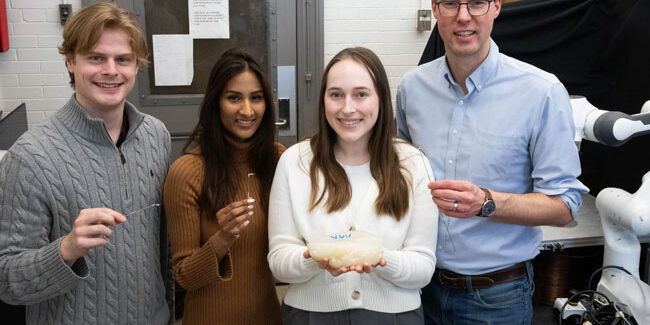TORONTO, Jan. 26 /CNW/ – Locally developed image encryption technology that makes privacy the default for video surveillance involving images of individuals will be featured at a major Toronto privacy event hosted by Ontario Information and Privacy Commissioner, Dr. Ann Cavoukian, on Thursday January 28 – International Data Privacy Day.
Awarded a $110,000 research grant by the Natural Sciences and Engineering Research Council of Canada to guide it through to commercialization, the Secure Visual Object Coding solution was developed by Karl Martin of the University of Toronto’s The Edward S. Rogers Sr. Department of Electrical and Computer Engineering, and Professor Kostas Plataniotis of the Identity, Privacy and Security Institute, University of Toronto. Using innovative object-based encryption, it completely obscures the images of individuals who are the subjects of video surveillance. However, unlike current permanent masking techniques, the technology enables the images to be decrypted later on by authorized staff when an incident occurs that demands further investigation for safety or security purposes.
Commissioner Cavoukian first heralded this work as part of her 2007 investigation report into Toronto Transit Commission’s (TTC’s) use of video surveillance. The Commissioner today welcomed the new research funding, to be celebrated at the Privacy by Design: The Gold Standard event on Thursday.
“This is a vital privacy-enhancing technology and I’m delighted to see it take solid steps towards entering the marketplace,” said Commissioner Cavoukian. “This type of solution allows for video surveillance to be conducted when necessary, without the privacy concerns associated with routinely monitoring and preserving images of individuals as they go about their daily activities. It also enables surveillance and privacy to co-exist, side by side – without forfeiting one for the other: positive sum, not zero-sum. This is what I call Privacy by Design – and every surveillance camera should be fitted with this remarkable technology.”
“This is an excellent example of research that advances an important branch of science and that addresses a real world market need,” says Professor Peter Lewis, Acting Vice President, Research at the University of Toronto. “We are pleased to be working with Xiris Automation, Inc. on this project and we are thankful to NSERC and the Ontario Information and Privacy Commissioner for their support.”
Jointly sponsored by the Toronto Board of Trade, the January 28 event marks the Commissioner’s second annual Privacy by Design Challenge, marking International Data Privacy Day. To demonstrate the practical applications of Privacy by Design, this year’s conference focuses on the implementation of new technologies, business practices, and networked infrastructures, and how they can deliver on the promise of PbD in a solid, tangible manner.
Privacy experts will share their insights regarding a wide range of practices, including:
- latest developments in privacy-protective video surveillance;
- use of state-of-the-art encryption to protect personal information on mobile devices; and
- impact of ubiquitous computing on home healthcare.
Headlining the list of distinguished speakers are two leaders who will set the stage for future applications of Privacy by Design – Dr. Kai Rannenberg, T-Mobile Chair for Mobile Business and Multilateral Security at Goethe University, Frankfurt, Germany, who will speak on Privacy by Design in Mobile Applications and Location-Based Services, and N. Arthur Smith, Founder and CEO of GS1 Canada, part of a major international supply chain standards organization, who will share his insights on Managing Privacy in the Evolution of the Internet of Things.
The January 28 morning event begins with registration and breakfast at 7:30 a.m., at the Board of Trade, with the program starting at 8:30 a.m. You can also follow the event on Twitter @embedprivacy



